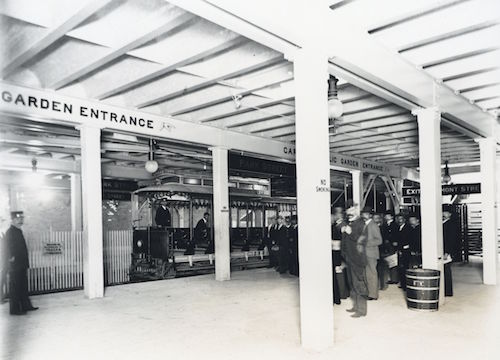Communiqué
“The Race Underground” AMERICAN EXPERIENCE | Encore Broadcast on Tuesday, November 12 at 9
< < Back to the-race-underground-american-experience-encore-broadcast-on-tuesday-november-12-at-9American Experience The Race Underground
To Have Encore Broadcast on Tuesday, November 12, 2019
Film Explores the Battle to Build America’s First Subway
In the late 19th century, as America’s teeming cities grew increasingly congested, the time had come to replace the nostalgic horse-drawn trolleys with a faster, cleaner, safer, and more efficient form of transportation. Ultimately, it was Boston — a city of so many firsts — that overcame a litany of engineering challenges, the greed-driven interests of businessmen, and the great fears of its citizenry to construct America’s first subway. Based in part on Doug Most’s acclaimed non-fiction book of the same name, The Race Underground tells the dramatic story of an invention that changed the lives of millions. Written, produced and directed by Michael Rossi and executive produced by Mark Samels, The Race Underground will have an encore broadcast on American Experience Tuesday, November 12, 2019, 9:00-10:00 p.m. ET on PBS.

“Each day, millions of Americans step onto a subway car and travel underground and don’t think twice about it,” said American Experience Executive Producer Mark Samels. “It’s fascinating to see how the concept of the subway — a seemingly impossible invention that once struck terror in the heart of the public — so quickly became an everyday part of life for millions of American commuters.”
In the late 1800s, Boston reigned as America’s most crowded city, with nearly 400,000 people packed into a downtown of less than one square mile. With more than 8,000 horses pulling the trolleys, the city was filthy and noisy, reeking of manure and packed with humanity.
But a young American inventor named Frank Sprague had a revolutionary idea. Inspired by his visits to the London Underground, Sprague envisioned a subway system that would trade London’s soot-spewing coal-powered steam engine with a motor run on the latest technology — electricity. After an early job with his idol Thomas Edison, Sprague launched his own venture, the Sprague Electric Railway & Motor Company. Seeking investors, he first struck out with financier Jay Gould after almost setting the mogul on fire during a demonstration. He soon found backing with the wealthy capitalist Henry Whitney, who owned a fortune in suburban Boston real estate and quickly saw the financial upside of connecting his desirable residential neighborhoods with the city’s economic center. Whitney also proposed the consolidation of Boston’s seven existing streetcar companies — all under his control. When the Massachusetts General Court granted Whitney the monopoly, he announced an unprecedented plan — to build the nation’s first subway.
Powered by Sprague’s technology and enthusiastically supported by Boston Mayor Nathan Matthews, the project threw the city into a voluble debate.
“The Boston subway was not a foregone conclusion, not by a long shot. There was a petition at one point where 12,000 businessmen opposed the subway,” said historian Stephen Puleo. “There were going to be streets torn up, sewer systems affected, water lines affected, electrical lines affected. Secondly, folks felt like traveling underground was very close to the netherworld, that you were getting closer to the devil, that you were taking this great risk in God’s eyes by traveling on a subway.”
The debate raged on, but the Mayor finally convinced the city that the new subway would provide much-needed jobs and not infringe on the city’s beloved Boston Common. After two years of construction, Boston’s new subway made its first trip on September 1, 1897. Despite lingering fears, more than 250,000 Bostonians rode the underground rails on its first day. In its first year of operation, 50 million passengers would ride the Boston system, and within ten years, New York and Philadelphia opened subways, with more American cities to follow.
“Frank Sprague lived in the shadow of Edison but played as important a role in the development and growth of cities as any person in our history,” said author Doug Most. “His motor is one of the most important contributions, right there alongside Henry Ford’s vehicle and the Wright Brothers’ plane, as one of the most important engineering achievements of our time.”
About the Participants, in Alphabetical Order
Asha Weinstein Agrawal is Director of MTI’s National Transportation Finance Center at San José State University, and also an Associate Professor in the Urban and Regional Planning Department at San José State.
Brian Cudahy is a historian of mass transit and author of several books including Change at Park Street Under: The Story of Boston’s Subways and Cash, Tokens, and Transfers: A History of Urban Mass Transit in North America.
Frederick Dalzell is a historian and author of Engineering Invention: Frank J. Sprague and the U.S. Electrical Industry.
Mark Gelfand is an associate professor of history at Boston College.
Clifton Hood is a professor of history at Hobart and William Smith Colleges and author of 722 Miles: The Building of the Subways and How They Transformed New York.
Doug Most is the director of strategic growth and content at The Boston Globe and author of The Race Underground: Boston, New York, and the Incredible Rivalry That Built America’s First Subway.
Stephen Puleo is a historian and author whose books include A City So Grand and The Boston Italians.
Rosalind Williams is Bern Dibner Professor of the History of Science and Technology at MIT and author of Notes on the Underground: An Essay on Technology, Society, and the Imagination.
About the Filmmakers
A Rossi Films Production For American Experience
Written, Produced and Directed by Michael Rossi
Edited by Jon Neuburger
Narrated by Michael Murphy
Coordinating Producer Melissa Martin Pollard
Based in part on the book The Race Underground: Boston, New York, and the Incredible Rivalry That Built America’s First Subway by Doug Most
Original Music by Gary Lionelli
Cinematography by Jason Longo
American Experience is a production of WGBH Boston
Senior Producer Susan Bellows
Executive Producer Mark Samels

